You searched for: google广告设计师【TG飞机:@bapingseo】谷歌工具优化大全【TG电报:@bapingseo】如何提高谷歌搜索seo【Telegram:@bapingseo】2021斗牛牛下载ku真人娱乐登录平台官网?7JcW4U/vF5MHE.html
<< Previous | Displaying results 201-210 of 270 for "google广告设计师【TG飞机:@bapingseo】谷歌工具优化大全【TG电报:@bapingseo】如何提高谷歌搜索seo【Telegram:@bapingseo】2021斗牛牛下载ku真人娱乐登录平台官网?7JcW4U/vF5MHE.html" | Next >>
-
Johanna Falkenstein Heumann
ID CardThe oldest of five children, Johanna was born to Jewish parents living in a small town near Cologne. Her father owned a cigar factory. After Johanna graduated from high school, she worked in a bank in Cologne. At 22 she married Carl Heumann and the couple settled in the village of Hellenthal near the Belgian border. There they owned a general store. The couple had two daughters, Margot and Lore. 1933-39: A year ago Johanna's family moved to nearby Bielefeld, and she enrolled Margot and Lore in the city's…
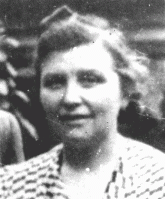
-
Edek Blonder
ID CardThe Blonder family lived in a two-room apartment in the back of a store. Edek was the third of eight children. His father eked out a meager living by tutoring students in Jewish subjects, and beginning in 1930 he worked distributing food vouchers to the poor. 1933-39: After graduating from secondary school, Edek was invited to play soccer professionally on the local Club Maccabi team, which was part of a Jewish soccer league. Club Maccabi arranged for him to attend trade school to learn cabinet making at…
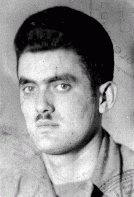
-
Leon Kusmirek
ID CardLeon was the oldest of two boys born to a Jewish family in Zgierz, a central Polish town in the heart of Poland's textile producing region. The family lived at 15 Konstantynowska Street. Leon's father worked at a textile factory. At age 7, Leon began attending public school in the morning and religious school in the afternoon. 1933-39: On Friday, September 1, 1939, Leon's mother had just returned from the market when the family saw German planes. On Sunday they flew over again, lower, panicking the city.…
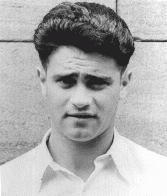
-
Moses Rechnitz
ID CardThe younger of two children, Moses was born to Jewish parents living in the southwestern Polish town of Bedzin. When he was 7, his family moved to the nearby city of Katowice where his father had a wholesale leather business. The Rechnitzes lived in a three-bedroom, upper-floor apartment on Jordana Street. Moses attended a Polish elementary school and also received religious instruction. 1933-39: In secondary school, Moses was one of the only Jewish pupils. He first encountered antisemitism when a teacher…
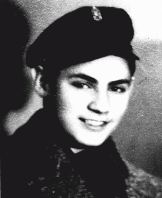
-
Adela Low
ID CardAdela, known as Udl to her family, was one of four children born to a Jewish family in the Polish town of Ulanow. Her father was a landowner and cattle merchant, transporting calves from the Ulanow area for sale in other towns in the region. From the age of 3, Adela attended a private religious school for girls where she learned Jewish history and Hebrew. At age 7 she began public school. 1933-39: Adela came from a charitable family; when her mother baked challah, a special bread for the Jewish Sabbath,…
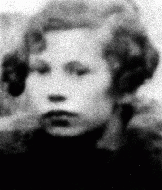
-
Herschel Low
ID CardHerschel was the oldest of four children born to a Jewish family in the Polish town of Ulanow. His father was a landowner and cattle merchant who transported calves from the Ulanow area for sale in other towns. Herschel attended a religious school from the age of 3, and started public school at age 7. 1933-39: Since Herschel was skilled with his hands, his father got him a job weaving reed baskets after he graduated from high school. Herschel was also a member of a Jewish youth organization, Benei Akiva,…
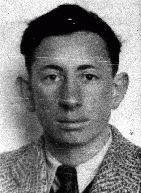
-
Mieczyslaw (Marek) Madejski
ID CardMieczyslaw was the eldest of three sons born to well-to-do Roman Catholic parents in Poland's capital of Warsaw. His father was a real estate developer and his mother was a housewife. Mieczyslaw, or Mieteck as he was nicknamed, began attending public elementary school in 1930 when he was 7 years old. 1933-39: Mieczyslaw's father urged him to study either German or Russian because he thought it was likely that there would be a German or Soviet invasion. Germany invaded Poland on September 1, 1939. During…
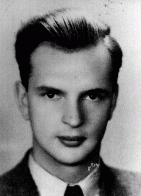
-
Dismissal letter from the Berlin transit authority
DocumentA letter written by the Berlin transit authority (Berliner Verkehrs Aktiengesellschaft) to Viktor Stern, informing him of his dismissal from his post with their agency as of September 20, 1933. This action was taken to comply with provisions of the Law for the Restoration of the Professional Civil Service. On April 7, the German government issued the Law for the Restoration of the Professional Civil Service (Gesetz zur Wiederherstellung des Berufsbeamtentums), which excluded Jews and political opponents…
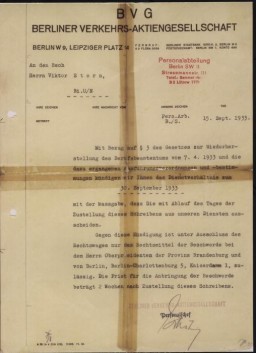
-
Roosevelt announces aid for Britain
FilmAlthough constrained by powerful isolationist sentiment in the United States, President Roosevelt was determined to help democratic Great Britain continue the war against Nazi Germany. Even as he promised to keep the United States neutral in the European war, Roosevelt ordered the expansion of military construction and pledged--as shown in this footage--that the United States would serve as the "great arsenal of democracy." In March 1941, Congress approved Lend-Lease aid for Britain. Britain ultimately…
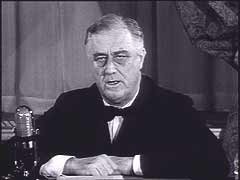
-
Defeat of Nazi Germany, 1942-1945
MapBeginning in 1938, the Nazis increased their territorial control outside of Germany. By 1942, three years into World War II, Nazi Germany reached the peak of its expansion. At the height of its power, Germany had incorporated, seized, or occupied most of the continent. However, also in 1942, the Allied Powers started to systematically bomb Germany. They would continue to do so until Germany's surrender in 1945, weakening the war effort and demolishing cities. Slowly, the Allied Powers began pushing…

